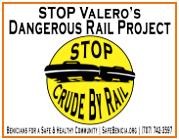Repost from SolanoCounty.com News Details
[Editor: this event has been referred to alternately as a “discussion” a “forum,” an “information session,” a “public meeting,” and a “community conversation,” Very little has been published to indicate that the County is eager to hear from the public at this meeting. Nonetheless, governmental meetings always provide an opportunity for the public to be heard. If you go, plan to learn something from emergency professionals, government officials and staff … and to offer your own sage advice on the best way to contain catastrophic emergencies…. – RS]
Rail safety discussion planned for Sept. 29
September 8, 2014SOLANO COUNTY – How can emergency responders increase their capabilities to respond to potential incidents that could happen along the 73 miles of railway that cross Solano County?
That is the question to be discussed at an information session from
6 to 8:30 p.m. Monday, Sept. 29, in the Board of Supervisors Chambers at the County Administration Center, 675 Texas St. in Fairfield.
“As we prepare for and anticipate the transportation of crude oil through our county, a community conversation about our preparedness and the potential impact from an incident is essential,” said Supervisor Linda Seifert.
The meeting’s objective will be to raise awareness of the existing safety measures already in place throughout the county and to identify potential gaps and mitigations based on potential changes in rail traffic.
Invited speakers include representatives from Valero, Union Pacific Railroad, Solano County Office of Emergency Services, the Solano County Fire Chiefs Association, and local air quality management districts. Congressman John Garamendi and state Senator Lois Wolk have also been invited to participate.
County officials said the timing of the event was two-fold. September is National Emergency Preparedness Month. In addition, the City of Benicia is considering an application that would allow Valero to receive and process crude oil delivered by rail.
“We know emergency responders from across the county, including the Hazardous Materials Response Team, are prepared for a wide array of potential incidents. Proposals to process crude oil delivered by rail will change the mix of materials coming into and passing through Solano County. It is only prudent for us to explore how to increase our capability to handle the risks associated with these changes,” Supervisor Seifert said.





![Kinder Morgan [Facebook page]](https://i0.wp.com/www.rawstory.com/rs/wp-content/uploads/2014/09/Kinder-Morgan-Facebook-page.jpg?resize=474%2C266) SAN FRANCISCO (Reuters) – A San Francisco Superior Court judge on Friday dismissed a lawsuit brought by environmental groups against Kinder Morgan’s Richmond, California, rail terminal, which quietly began unloading crude oil from trains this year, saying the plaintiffs waited too long to file their complaint.
SAN FRANCISCO (Reuters) – A San Francisco Superior Court judge on Friday dismissed a lawsuit brought by environmental groups against Kinder Morgan’s Richmond, California, rail terminal, which quietly began unloading crude oil from trains this year, saying the plaintiffs waited too long to file their complaint.
You must be logged in to post a comment.